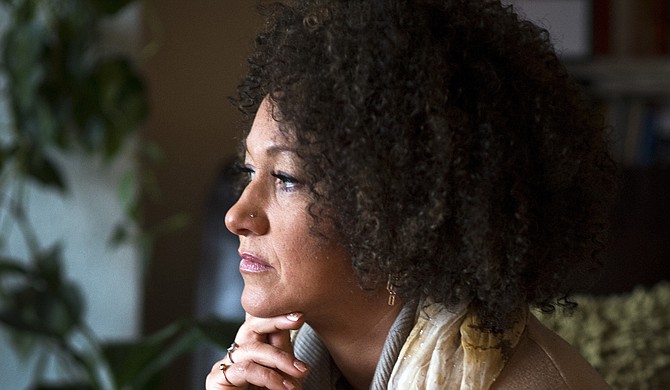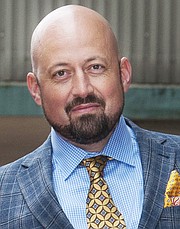Long before she drew controversy for allegedly misrepresenting her racial background, Rachel Dolezal was a student in Jackson involved with community groups. Friends such as Kass Welchlin remember her as a giving person and a talented artist. Photo courtesy AP Images/Colin Mulvany
In 1998, I met Rachel Dolezal at Voice of Calvary Fellowship, a church in Jackson, Miss. We are the same age, and we became friends. She was a direct and serious person, and every aspect of her life seemed to embody deep expression. Her artwork is impeccable: obviously trained, passionate and personal to her. I recall one Christmas church service where Rachel's dance performance of "Mary Did You Know" was breathtaking, an evocative expression of Mary's sacrifice of her son Jesus.
If this were all America knew about Rachel, we might just ask her a simple question about lying. However, there's more to her life. Most if not all of Rachel's artwork and style was and is centered on African or African American culture. If her breathtaking Christmas dance at church was stylistically Asian, or any of her artwork were European, or if she ever dabbled in Native American pottery, or if her hairstyles weren't so "black," we might be able to say she loves all cultures, that she's balanced or impartial. That's not the case.
When Rachel's story began trending this month, media outlets immediately began shucking the most symmetrical assumptions of race and ethnicity. The headlines ranged from "Hero" to "Hater." Other headlines included: "Rachel Dolezal, Spokane NAACP leader outed as WHITE by her parents," "Rachel Dolezal 'Trans-Racial' Controversy," "The surprising ways Caitlyn Jenner and Rachel Dolezal are now linked" and "Passing for Black." The media began scrutinizing the life of a woman whose asymmetric life has now created a unique national dialogue on race, ethnicity, identity, altering identity and integrity. Periodically, we hear about her public service or her artistic skill.
When I saw the viral video of her interview, the one she walked out of saying, "I don't understand your question," I knew immediately she hadn't changed much over the years. It would be wrong for me to say she and I were "really close" or "best" friends or that we shared deep secrets. However, we have a lot in common. Firstly, we both understand that race in America is anything but symmetrical (i.e. one or the other, black or white, good or bad, right or wrong).
My life is asymmetrical. I don't freely offer explanations of the complexities of my life, in the same way she does not jump through hoops to explain hers. If I'm in a room full of strangers, all black folks (African American, if you prefer), I don't jump for the first opportunity to tell everyone, "Hey, I can relate."
In the same way, if I were in a room with all white folks (Anglo-Saxon/European-American, if you prefer) I don't share openly: "Hey nice to meet you. I'm married, and she's black. How are you?"
As a former salesman, I was in the business of offering investments and insurance, often times earning sales by gaining trust. In spite of the trust I earned from my clients I offered very little information about myself. I resisted relational transparency with my clients because many people draw conclusions about others as quickly as possible, so the fewer questions they can ask, the better. In sales, it's possible that I benefitted from the omission of my multi-cultural family. One former client was told about my wife, and she lamented, "Say it's not so?"
Rachel and I, among many others, were both submerged in the "Antioch Community" of Spencer Perkins (deceased) and Chris Rice of the Center for Reconciliation at Duke University. In this intentionally interracial community, breaking down social walls of hostility and pursuing authentic relationships was a common and decisive experience. Neither of us had difficulty interacting with people of other cultures.
From movies, media and social media—the platform my generation has relied on for our first introductions to life's big ideas—it's clear that we are not separating race from the discussion of Rachel's integrity. We as Americans struggle more than ever to articulate the richness of our commitments, according to Robert Bellah, in his book, "Habits of the Heart: Individualism and Commitment in American Life."
Rachel is one of the casualties of this struggle. It's not easy to explain how and why any of us make decisions in life, but as Elvis said, "Before you abuse, criticize and accuse, walk a mile in my shoes."
It's wrong to expect such an easy explanation from Rachel. If she's given the time, I'm certain she'll share her heart. I bet it will be a beautiful thing to see.
Kass Welchlin lives in Jackson, Miss., and has been married for 13 years to Cassandra Welchlin. They have three kids.




Comments
Use the comment form below to begin a discussion about this content.
comments powered by Disqus